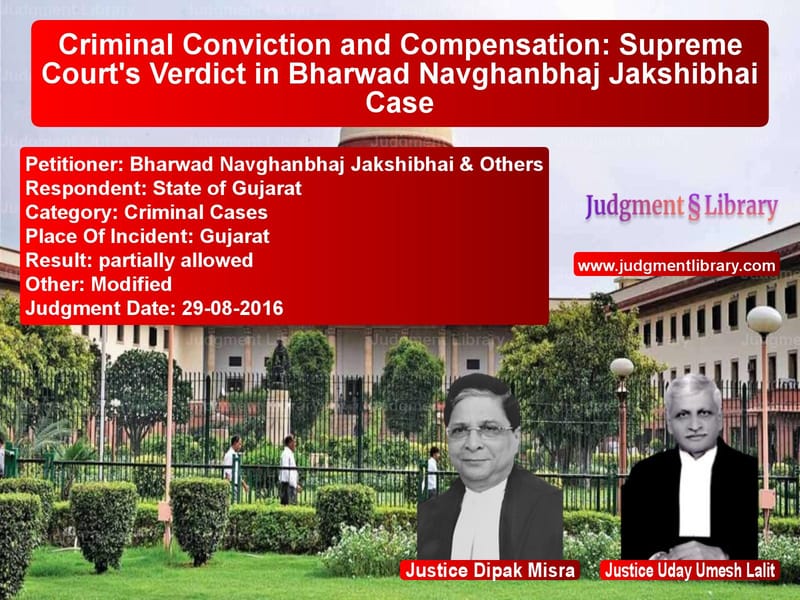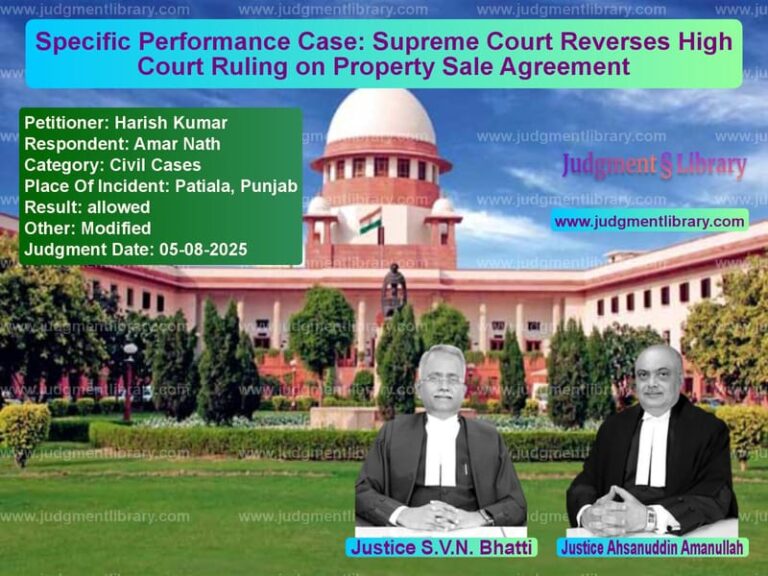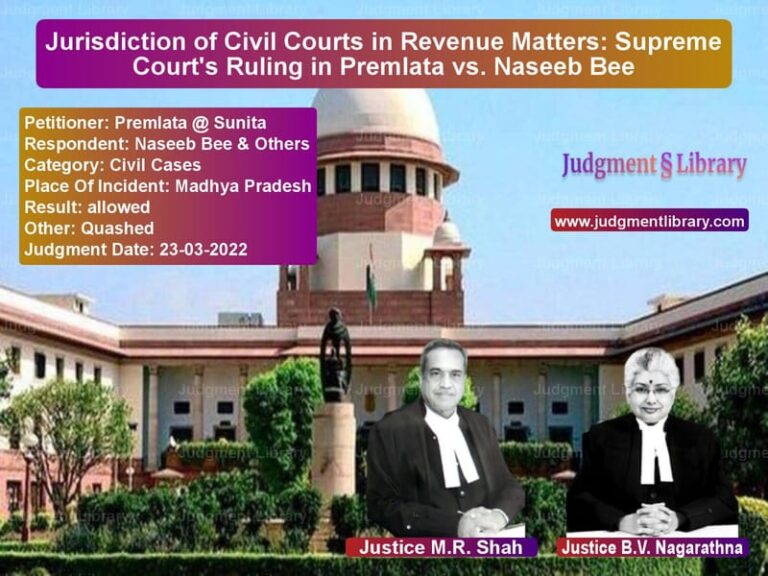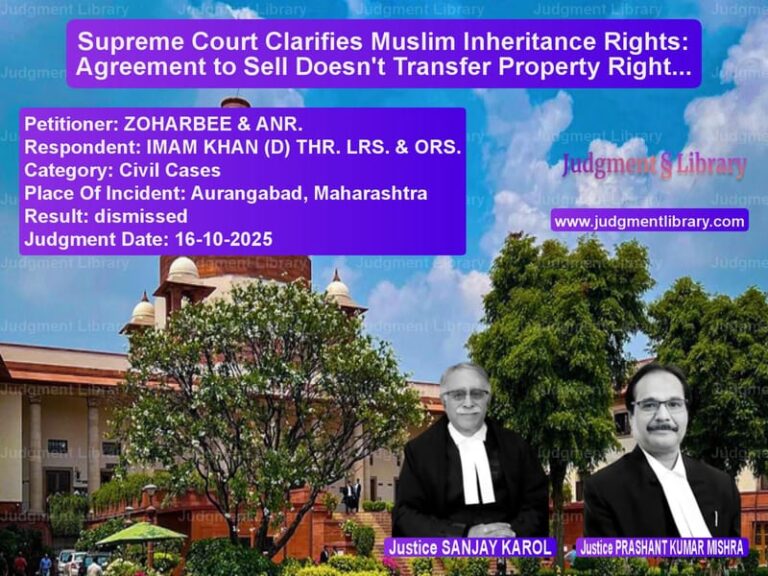Criminal Conviction and Compensation: Supreme Court’s Verdict in Bharwad Navghanbhaj Jakshibhai Case
The case of Bharwad Navghanbhaj Jakshibhai & Others vs. State of Gujarat revolved around a criminal dispute involving multiple accused who were convicted under various sections of the Indian Penal Code (IPC) for unlawful assembly, causing grievous hurt, and criminal intimidation. The Supreme Court of India adjudicated on whether the conviction and sentencing of the accused were justified and whether the quantum of punishment should be modified.
Background of the Case
In this case, 14 accused, including the appellants, were convicted by the Sessions Judge, Patan, in Sessions Case No. 27 of 2008 for various offences, including unlawful assembly, causing grievous hurt, and criminal intimidation. The trial court sentenced them under multiple IPC sections, including Sections 147, 148, 326, 324, 325, 504, and 506(2), with varying durations of imprisonment and fines.
The convicted accused appealed against their sentences before the Gujarat High Court. The High Court, while upholding the conviction, enhanced the sentence under Section 326 IPC from 2 years to 5 years of rigorous imprisonment, considering the gravity of the offence. Aggrieved by this enhancement, the accused approached the Supreme Court through special leave petitions.
Charges and Sentences by the Trial Court
The Sessions Court found the accused guilty under the following sections:
- Section 147 and 148 IPC: Unlawful assembly and rioting – fine of Rs. 1,000.
- Section 326 read with Section 149 IPC: Voluntarily causing grievous hurt by dangerous weapons – 2 years of rigorous imprisonment.
- Section 324 and 149 IPC: Voluntarily causing hurt by dangerous weapons – fine of Rs. 2,000.
- Section 325 read with Section 149 IPC: Voluntarily causing grievous hurt – 2 years of rigorous imprisonment.
- Section 504 and 506(2) IPC: Intentional insult and criminal intimidation – no separate sentence.
Arguments by the Appellants
The appellants raised the following arguments before the Supreme Court:
- There was an over-implication of accused persons as 14 people were charged for only 8 injuries on the victim’s body.
- The injured person had not suffered any serious or permanent injuries, making the punishment of 5 years excessive.
- The High Court should not have enhanced the sentence as the appellants had already served a part of their sentence.
- The conviction should be reconsidered, and instead of rigorous imprisonment, the fine amount should be increased as compensation.
Arguments by the Respondents
The State of Gujarat, represented by the prosecution, countered the appellants’ claims with the following arguments:
- All accused formed an unlawful assembly with a common object and participated in the attack.
- The victim suffered multiple injuries, including fractures, which justified the higher sentence.
- The High Court correctly increased the sentence from 2 years to 5 years, considering the severity of the attack.
Supreme Court’s Observations
The Supreme Court examined the case records and the evidence presented at trial. The Court noted:
“The conclusion arrived at by the High Court rightly sums up the matter in following words: ‘All of them were members of an unlawful assembly with a common object. All of them attacked the original complainant at his place. All of them were charged under Section 149 IPC, and mere membership of an unlawful assembly is sufficient to impose vicarious liability.’”
The Court agreed with the prosecution that the principle of unlawful assembly made all accused responsible for the crime, even if individual roles were not explicitly detailed.
Final Judgment
The Supreme Court upheld the conviction but modified the sentence in the following manner:
- The conviction and sentence imposed by the Trial Court were restored.
- The increased sentence of 5 years imposed by the High Court was reduced back to 2 years of rigorous imprisonment.
- The compensation amount was enhanced to Rs. 55,000 per accused to be paid to the injured victim, Gelabhai.
- The amount deposited by the original accused Nos.1 and 7 (Rs. 70,000) was directed to be transferred to the complainant.
- The accused who had already deposited Rs. 35,000 each were required to pay an additional Rs. 20,000.
- Failure to deposit the compensation would result in an additional one year of imprisonment.
- The accused were directed to surrender within one month to serve their sentence.
Implications of the Judgment
This Supreme Court ruling sets important legal precedents:
- Reinforcement of Unlawful Assembly Principle: The Court emphasized that all members of an unlawful assembly share collective responsibility.
- Balance Between Punishment and Compensation: The Court balanced justice by reducing imprisonment while increasing compensation for the victim.
- Encouraging Rehabilitation: By imposing higher fines instead of excessive imprisonment, the judgment focuses on victim restitution rather than prolonged incarceration.
- Judicial Review of Sentence Enhancements: The ruling highlights the Court’s power to reassess enhanced sentences to ensure proportionality.
Conclusion
The Supreme Court’s decision in Bharwad Navghanbhaj Jakshibhai vs. State of Gujarat reaffirms the principles of unlawful assembly and collective liability while ensuring that sentences remain fair and proportionate. The ruling strikes a balance between penal consequences and victim compensation, ensuring justice for both parties involved.
Don’t miss out on the full details! Download the complete judgment in PDF format below and gain valuable insights instantly!
Download Judgment: Bharwad Navghanbhaj vs State of Gujarat Supreme Court of India Judgment Dated 29-08-2016-1741878565974.pdf
Direct Downlaod Judgment: Direct downlaod this Judgment
See all petitions in Attempt to Murder Cases
See all petitions in Fraud and Forgery
See all petitions in Theft and Robbery Cases
See all petitions in Judgment by Dipak Misra
See all petitions in Judgment by Uday Umesh Lalit
See all petitions in partially allowed
See all petitions in Modified
See all petitions in supreme court of India judgments August 2016
See all petitions in 2016 judgments
See all posts in Criminal Cases Category
See all allowed petitions in Criminal Cases Category
See all Dismissed petitions in Criminal Cases Category
See all partially allowed petitions in Criminal Cases Category







